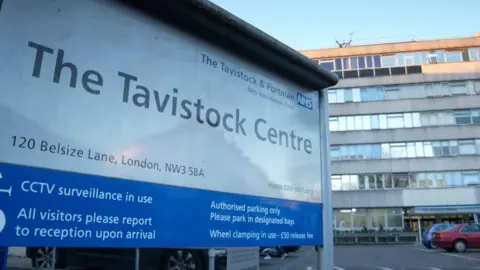 Getty Images
Getty ImagesSix new regional centres created to support under 18s struggling with their gender identity will open over the next two years, NHS England has confirmed.
They will join two existing clinics, as part of an overhaul of gender services for children and young people.
The emphasis will be on providing a more holistic approach, with a particular focus on supporting mental health and those with conditions such as autism.
It follows a ban earlier this year on the routine prescription of puberty blockers for children with gender dysphoria. The changes come in response to a landmark review published in April, which was critical of the way young people had been supported.
Puberty blockers
The Cass Review – led by paediatrician Dr Hilary Cass – called for better psychological support, noting that young people struggling with their gender had higher rates of mental health problems and neurodiversity – such as autism and ADHD, or had experienced childhood trauma.
Previously, the only NHS clinic providing gender services for children was the Tavistock and Portman NHS Trust in London.
It was criticised for its approach which relied heavily on medical intervention, using puberty blockers to delay the onset of puberty, despite a lack of evidence the medication had a positive impact.
Its services had previously been rated as inadequate by inspectors in January 2021.
 PA Media
PA MediaThe Tavistock clinic was closed in March.
Two new services, in London and the north-west of England, were opened in April, run in conjunction with leading children’s hospitals Great Ormond Street and Liverpool’s Alder Hey.
The planned opening of six new regional hubs begins thsi autumn in Bristol, with another in the East of England due to open in March 2025.
The clinics will also serve children and young people in Wales. Ministers in Scotland are considering a similar approach.
NHS England has also announced details of how the clinics will work.
GPs will no longer be able to refer patients directly. Instead, referrals will have to come via children and young people’s mental health services and hospital child health specialists.
The move is designed to ensure the wider needs of these children are assessed before they are sent to a specialist centre, and follows a sharp rise in referrals in recent years.
However, a proposal to only allow referrals after the age of seven was dropped.
‘Fundamentally different’
Additionally, care at the specialist centres will be overseen by a paediatrician or psychiatrist, with input from a range of other specialists.
Alongside mental health support and help for conditions such as autism, there will be an emphasis on supporting the whole family, including some social care provision in cases where there has been a breakdown in family relations.
Advice and guidance about social transitioning – when a young person presents as the opposite gender to their biological sex – will also be available.
The regional centres will also support young people turning 18 who wish to access adult gender care services, where hormone treatments and surgery are available – although these services are also set to be reviewed, NHS England has said.
NHS England medical director Prof Stephen Powis said the new system was about establishing a “fundamentally different and safer model of care for children and young people”.
 Getty Images
Getty ImagesNHS England hopes the changes will also help reduce waiting times.
A freedom of information request by PA Media, released this week, showed the average waiting time was 100 weeks for the 5,700 under-18s on the waiting list for specialist gender care. The youngest individual on the waiting list was under five years old.
Dr Cass said she was “pleased” NHS England was pushing ahead with implementing her recommendations.
But she added: “The next step will be the most challenging – turning it into reality.”
Last week the British Medical Association (BMA) called for the Cass review recommendations to be paused so it could carry out its own evaluation. It said the ban on puberty blockers should be lifted.
The BMA statement was in contrast to much of the medical establishment which has been supportive of the changes.




